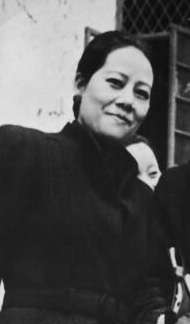Soong Ai-ling
Soong Ai-ling (traditional Chinese: 宋藹齡; simplified Chinese: 宋蔼龄; pinyin: Sòng Àilíng), legally Soong E-ling or Eling Soong (June 14, 1888 – October 18, 1973) was the eldest of the Soong sisters and the wife of H. H. Kung (Kung Hsiang-Hsi), who was the richest man in the early 20th century Republic of China. The first character of her given name is written as 靄 (same pronunciation) in some texts. Her Christian name was Nancy.
Nancy Soong Ai-ling | |
|---|---|
 | |
| Born | 14 June 1888 |
| Died | 18 October 1973 (aged 85) |
| Spouse(s) | Kung Hsiang-hsi (1881–1967), married 1914 |
| Children | Kung Ling-i Kung Ling-kai Kung Ling-chun Kung Ling-chieh (Louis C. Kung) |
| Parent(s) | Charlie Soong Ni Kwei-tseng |
Life
Born in Shanghai, she attended McTyeire School beginning at age 5.[1] Soong Ai-ling arrived in the United States at the Port of San Francisco, California on June 30, 1904, aboard the SS Korea at the age of 14 to begin her education at Wesleyan College in Macon, Georgia. She returned to China in 1909 after her graduation. In late 1911, she worked as a secretary for Sun Yat-sen, a job later succeeded by her sister, Soong Ching-ling, who later became Madame Sun Yat-sen.
Soong Ai-ling met her future husband, Kung Hsiang Hsi, in 1913, and married the following year in Yokohama. After marrying, Soong taught English for a while and engaged in child welfare work. She went to the United States in the 1940s. She died at age 83 on October 18, 1973 at New York-Presbyterian Hospital in New York City. She is interred in a mausoleum at Ferncliff Cemetery in Westchester County, New York.[2]
Children[3]
- Kung Ling-i (female) 孔令儀
- Kung Ling-kan (male) 孔令侃
- Kung Ling-chun,[4] also known as Kung Ling-wei (female) 孔令俊
- Kung Ling-chie (male) 孔令傑, also known as Louis C. Kung, was later an American oil executive.[5] He married actress Debra Paget in 1964;[6] the union ended in 1980. The couple had one son, Gregory Teh-chi Kung (born 1964) 孔德基. Louis C. Kung died in 1996 in Houston, Texas.[5]
Media portrayal
In the 1997 Hong Kong movie The Soong Sisters, Soong Ai-ling was portrayed by actress Michelle Yeoh.
References
| Wikimedia Commons has media related to Soong Ai-ling. |
- Pakula, Hannah (2009-11-03). The Last Empress: Madame Chiang Kai-shek and the Birth of Modern China. Simon and Schuster. p. 18. ISBN 9781439154236.
- Hu, Winnie (May 6, 2001). "For Chinese, Bliss Is Eternity in the Suburbs". New York Times.
- Lily Xiao Hong Lee (2003). 中國婦女傳記詞典: The Twentieth Century, 1912-2000. M.E. Sharpe. pp. 477–. ISBN 978-0-7656-0798-0.
- Frederic E. Wakeman (2003). Spymaster: Dai Li and the Chinese Secret Service. University of California Press. pp. 334–. ISBN 978-0-520-92876-3.
- Dawson, Jennifer "Bizarre bomb shelter becoming data center", Houston Business Journal. May 12, 2003; retrieved April 9, 2012.
- Bacon, James (April 21, 1962). "Debra Paget Weds Oilman, Nephew of Madame Chiang". Independent. p. 11. Retrieved June 11, 2015 – via Newspapers.com.

Further reading
- Seagrave, Sterling. The Soong Dynasty. Corgi Books, 1996. ISBN 0-552-14108-9.